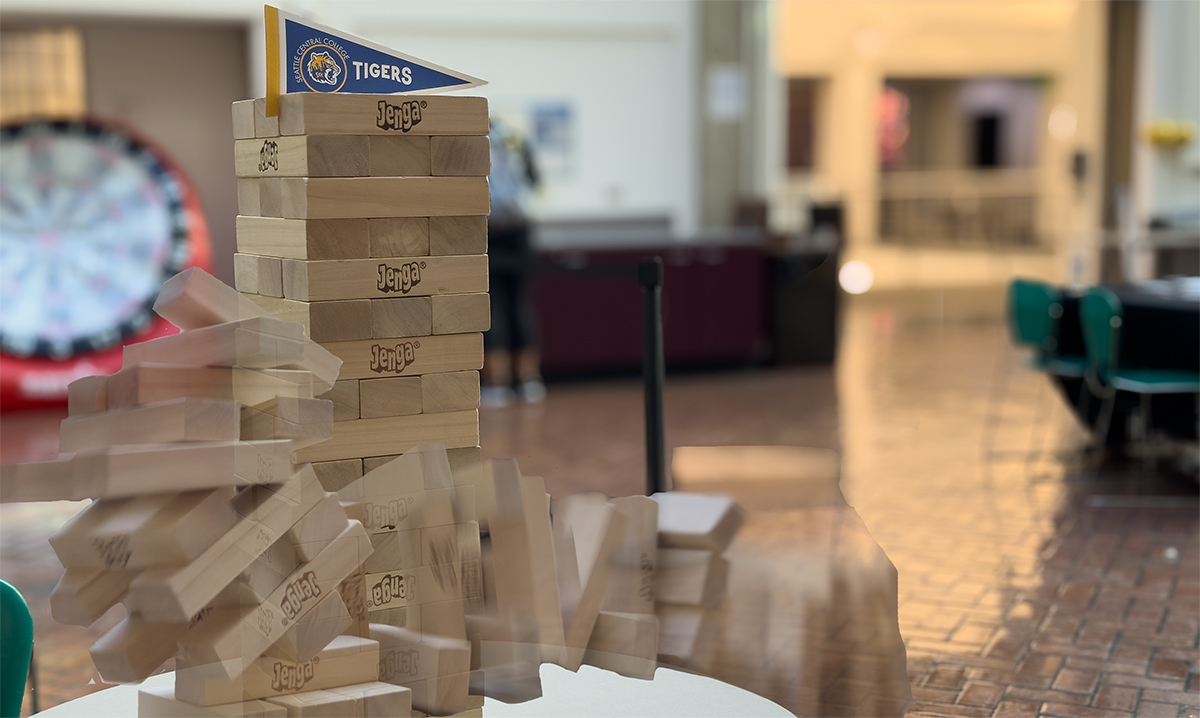The popular game Jenga somewhat describes the past year here at Central.
When the tower comes crumbling down, we often focus on the last piece pulled. In reality, the two most prescient questions are: Who is going to clean this mess up, and what was it that caused pulling the last piece out led the game to be unplayable?
In the interest of transparency, I am a student at Seattle Central; I am the President of the Consolidated Student Union and a writer and photographer for The Seattle Collegian, which is funded by S&A Fees and decided by the S&A Fee Committee. I have worked with many people in Student Leadership for over a year.
The email sent by Dean Kunbi Ajiboye and her subsequent administrative leave made students ask four main questions: Why did this happen? What led to this incident? Who is going to solve the problems this has caused, and how?
Before we continue, I ask that absolutely no hate be directed at staff, students, faculty, or administration. People were hurt, and abusing others with hateful speech is not how we heal.
Though all members of Central’s Student Leadership work tirelessly and with great expertise, there is a daunting employee hierarchy that allows little flexibility, accountability, and exchange of important information. Ultimately, that limits crisis management decisions to a few members of the college administration. Because of this limitation and the inability of those in power (administration) to address concerns raised by staff, the hurt felt by college students and staff became critical.
Last Spring quarter, our previous Dean of Student Development, the ever-loved-by-students Ricardo Leyva-Puebla, retired and left his position. The new dean, Dr. Kunbi Ajiboye, unbeknownst to staff and students, would later send a letter with a potential threat to a staff member, causing a cascade of problems at Central. If you want more information on that timeline, I recommend you read our news coverage of the situation and our follow-up with new emails we received.
Student impact
The Student and Activities Fee Committee (S&A) is a student-funded committee that allocates the school’s budget for many programs, both partially and fully. These programs include the Associated Student Council (ASC, our student government), ASC Book Fund, EDIC, Information Central, the M. Rosetta Hunter Art Gallery, Phi Theta Kappa (PTK), The Seattle Collegian, Student Parent Support Network, and more. S&A manages millions of dollars a year and decides each year where to distribute that money— except this year, as there was no Dean, S&A had no advisor until mid-October, with their first meeting unscheduled but likely occurring this month, more than seven weeks into the school year. This delay means that many funds that could have been allocated may be delayed.
An anonymous S&A member spoke to The Seattle Collegian, saying this delay may not just affect S&A but the Tech Fee Committee as well, “and actually not even just students,” the student-employee said, “IT stuff is under the student tech fee. [And] since Covid, this group has not existed.”
“Every year [the money] has only been used to maintain equipment, not acquire anything new, and as a result, we’ve accrued quite a lot of money that should be spent on technology at our school,” the student explained. “I think it’s significantly over $1 million. This is a committee that we intend to put together this year, and it would be made up primarily of [S&A] members because they already get very, very similar training.”
“Without an advisor, without these trainings…” the student says, “we’ll try to do as much as we can with the hand that we’re dealt this year.”
“All that money that you’re paying this school for technology, it’s just sitting in a budget that we were going to designate and put to the benefit of students.” The student says they’re unsure if the Tech Fee Committee will operate this year, “I don’t know if we’ll get the opportunity this year.” The dean is the usual advisor of S&A, and the staff who are qualified to help are already swamped with work.
I asked the student if the administration handled the situation properly.
“‘Properly’ is perhaps the wrong word for it. For the most part, they handled it by the guidelines they set for themselves. But these guidelines are sort of made to be the bare minimum of; here’s how we keep ourselves safe, here’s how we have a good process. Did they handle it with as much empathy as they needed to? I would say no… Absolutely not.”
—Anonymous S&A Committee student staff
Staff impact
The Seattle Collegian reached out to Student Leadership staff members, two of which will be quoted here. To keep them separate while helping them remain anonymous, we will call one “Dove” and the other “Crow.”
After the alarming email(s) Dean Ajiboye sent, staff were immediately concerned. At first, as word was hushed by Vice President of Student Services Kao LeZhao, worry grew exponentially. Without the ability to properly share information and the perceived threat of gun violence, many employees were understandably worried for their safety and the safety of their comrades at the college. This eventually did alleviate a little bit, as staff learned more from each other, and a vote of no confidence circulated with a quote from Dean Ajiboye’s Aug. 31 email, finally giving staff who had not read the email access to an excerpt from that email. While this assuaged some fears, it also made many staff question what was happening even more.
“With nothing of meaning and I am whose them at the student with the gun[sic].” —Dr. Kunbi Ajiboye, in an email sent to Seattle Central’s leadership members
This is what the staff saw in the letter of no confidence. It is included in The Seattle Collegian writer Sophia Bruscato’s initial coverage of this story. “With nothing of meaning and I am whose them at the student with the gun[sic].” —Dr. Kunbi Ajiboye, in an email sent to Seattle Central’s leadership members
It was unclear what the dean meant, and without sufficient communication from VP Lezhao, staff were left with nothing to ease their concerns. This not only harmed the staff with the stress of this message but harmed any potential reconciliation, if there ever was to be any, especially considering that there was a perceived threat of violence.
In an interview, Dove was asked how they felt about the mention of a gun in the email. According to Dove, the line being a threat did not quite match their expectations of the dean, but the threat of a gun is ”life and death,” with ambiguity being a stressor. Dove also said, “Do we overreact when we hear the word gun?” This is a question I am still thinking about.
Crow said the situation was a massive failure by Human Resources and VP Kao LeZhao, who did not disclose how severe the whole situation was, “I felt like the Dean was in a mental crisis,” said Crow.
“And reading through that email, it also makes me really upset in retrospect,” expressed Crow. They said that front-line staff was not contacted by the administration, and they were not given as many resources and privacy, unlike the Dean. “In that situation, she did need that assistance, but we needed it too.”
I asked if they reached out to the Dean or the Vice President directly. “At no point have I felt I was able to give constructive criticism to the dean.” Dove says Ajiboye always questioned qualifications and experience. Feeling like Dove could not give feedback to the Dean, they did not want to risk giving feedback to the VP LeZhao either. “Basically, I just didn’t think anything would be done if I talked to the Vice President of Student Services.”
Crow says that in the way communication structures work at the colleges, there really isn’t an official way to get information past your immediate superior, so complaints about the dean being unreceptive to feedback were officially impossible to work with. “Honestly, a lot of what I noticed early on is how much the dean used her power dynamics to her advantage.”
“If someone can use power dynamics and there’s zero accountability, that plants the seeds for a very hostile work environment.”
—Crow
Rebuilding the Jenga tower
There’s been a lot of pain here at Central. We will heal. While abuse of power, bosses targeting staff to get them fired, admin not listening or reaching out to staff, and “ass-covering” is hardly, and unfortunately, not a new or rare phenomenon at the colleges. It is still tragic for what impact it had on the staff and the college as a whole.
Reconfiguring the Central is an arduous task, but it must be done. The hierarchy of school positions lends itself more to a military institution than to one of education. Education relies on the free flow of ideas and information, and Central is not conducive to this. The school must reduce its unnecessary and inefficient bureaucracy and add more democratic participation for staff, students, and faculty. We’re already working to heal, fill vacant roles, and move forward. Wish us luck.
Author

Idaya is a student here at Seattle Central College who is always looking out for the health of our communities; here at Central, in Seattle, and, as per Idaya’s lofty aspirations, a healthy international community as well. As a writer and photographer, Idaya loves to report on current events, keeping the community well informed.







“The hierarchy of school positions lends itself more to a military institution than to one of education.”
Bravo to this student writer for getting it more clearly than most faculty in our district. The hierarchy itself is the problem, and it doesn’t become less so based on who is hired into the hierarchy. Until the system itself changes, we as a district are holding ourselves back.